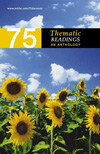
Sallie Tisdale |  |
Sallie TisdaleSallie Tisdale, "We Do Abortions Here" Sallie Tisdale (1957- ) was born in Eureka, California and earned
a B.S. in nursing from the University of Portland in 1983. Tisdale's been
a registered nurse, and has taught at Reed College, Northwestern University,
and New York University. Her books include The Sorcerer's Apprentice:
Tales of the Modern Hospital (1986), Harvest Moon: Portrait of
a Nursing Home (1987), Talk Dirty to Me: An Intimate History of
Sex (1994), and The Best Thing I Ever Tasted: The Secret of Food
(2000). Her work also frequently appears in such periodicals as Conde
Nast Traveler, the New York Times Magazine, and The Antioch
Review, and Tisdale is an editor at Harper's as well as a columnist
for the online magazine Salon. Among numerous awards and honors,
Tisdale was a National Endowment for the Arts fellow in 1989. "We
Do Abortions Here," a look inside an abortion clinic from both her
literary and her professional nursing perspectives, was first published
in 1990 in Harper's Magazine. | QUESTIONS FOR DISCUSSION | CONTENT - What does Tisdale recount early in the essay about an eighteen-year-old
woman's arms?
- With what two words does the author describe a typical abortion
procedure?
- Explain the phrase the great promise of birth control.
- How does Tisdale feel about her job? What does she say she has
to offer?
- What is always the author's first question in an interview with
a prospective patient?
- How does the author describe "crisis pregnancy centers"?
- Discuss the boundaries that the people in Tisdale's clinic have
set for themselves. How flexible are they? In what circumstances?
STRATEGY AND STYLE - The author mentions that she's telling lies in at least two places.
Find them and describe the situations. Does this make her an unreliable
narrator? Explain.
- Study paragraph two, where the author describes the sameness of
her job. What literary device, especially near the end of the paragraph
does she employ to underline this idea of sameness?
- Examine the description of an abortion the author provides in paragraph
six. How long are the sentences? How many complex and compound sentences
are there? How would you characterize the tone of this paragraph? What
specific words and phrases can you point out to support your response?
- In paragraph four the author compares looking at abortion to something
else using a simile. What is the rest of the comparison, and how can
you relate it to her views of this medical procedure?
- At the end of paragraph twenty-two, the author uses another simile.
What is the comparison here? What mental image do you come up with?
How effective do you find this comparison?
| ENGAGING THE TEXT | - Imaginary situation: You and your loved one are facing an unexpected
pregnancy. Take it from there. What options do you have? What role will
your parents play? What is your course of action?
- Take some time and examine your feelings about abortion. How might
your feelings here have affected your reading?
| SUGGESTIONS FOR SUSTAINED WRITING | - In matters concerning abortion, the author writes that "the
absolute must always be tempered by the contextual." Write an essay
examining this statement, comparing and contrasting abortion with another
ethical issue such as the death penalty or euthanasia.
- In paragraph thirty the author makes a contrast between humans
and other animals about giving birth. Summarize this view as a thesis
statement, either agreeing or disagreeing with the author, and write
an essay supporting your point of view.
| FOR FURTHER RESEARCH | Tisdale discusses the notion of "the legal limit for an abortion"
within a pregnancy. Do some research about this topic, using one particular
U.S. state as your object of study. What laws does that state have on
the books regarding limits for abortions? What do these limits depend
on? Have these laws changed since 1990, when this piece was written? If
so, how? | WEB CONNECTION | Would you like to write a paper about abortion, but are unsure where
to begin? Take a visit to this abortion issues page
from ReligiousTolerance.org. There, you'll find links to a gamut of issues
ranging from abortion law to religious aspects to pregnancy prevention. | LINKS | Biographical Salon.com posted this biography
of the author, which also contains links to her online column. Read
this one and the one below and answer these questions: How does the
information differ between these two biographies? What, do you think,
accounts for the difference? Here is a brief biography
and a photo of Tisdale, prepared by the organization Feminists For Free
Expression.
Bibliographical Tisdale conducted this interview
following the release of her book The Best Thing I Ever Tasted.
Naturally enough, the major topic is food. Hungry for more? Click over to this Salon.com archive
of Tisdale's work. You'll find links to articles about family, writing,
travel, and more.
Cultural How about an inside look at a course Tisdale taught in Portland
this summer? Here's the course
description of "Mixed Media: Tools for Expression." Let's say you'd like to form a reading group about Talk Dirty
to Me. This page
from ReadingGroupGuides.com has some info about Tisdale's book, an excerpt,
an interview, and discussion questions. Read this review
of The Best Thing I Ever Tasted. From what perspectives do the
authors of the review approach the book? What do they think of it? Now
that you have more information about it, would you like to read the
book? Explain.
|
|
|
|